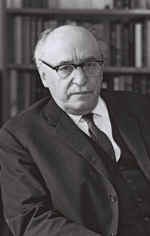Zalman Shazar
(1889 - 1974)
Zalman Shazar - labor Zionist leader, intellectual and historian - was elected President of the State of Israel in 1963.
Shazar was born in White Russia in 1889 as Shneor Zalman Rubashov, son of a Habad Hassidic family. From his initials - SZR - Shazar later derived his Hebrew name. He received a traditional Jewish education in a yeshiva (talmudic academy), but was widely read in secular literature, including socialist philosophy. Involved in labor Zionism from an early age, Shazar - an able publicist and editor - was arrested at age 18 by the Tzarist authorities for his revolutionary activity and writings.
When World War I broke out, Shazar was studying history and German philosophy and working as a journalist in Germany. Forbidden to leave the country, he became deeply involved in German Jewish life.
Immigrating to Palestine in 1924, he served in a variety of posts in the labor Zionist movement during the British Mandate, including those of editor of the Histadrut daily Davar, chairman of the Zionist Executive and head of the World Zionist Organization's Department for Education and Culture in the Diaspora. Shazar was elected as a member of the First Knesset and served as Israel's first Minister of Education and Culture in the critical years of mass immigration, when compulsory education and teaching Hebrew were essential tools for building social cohesion.
During Shazar's term of office as President of the State of Israel, the President's residence was relocated to modern premises in a quiet residential neighborhood of Jerusalem.
A gifted orator and a prolific writer of works ranging from historical tracts and polemics to poetry, Zalman Shazar infused the Presidency with an intellectual, even scholarly aura. His rich intellectual estate includes works on the history of Biblical criticism, the development of Yiddish literature, and the role of Kabbalah (Jewish mysticism) as one of the roots of Jewish messianic movements.
President Zalman Shazar hosted 80th birthday celebrations for famous Israeli writers such as S. Y. Agnon and Gershom Shalom and established a special fund to assist scholars and writers, which continues to operate to this day.
One of the projects he launched was the study group on Diaspora Jewry, established in conjunction with the Institute of Contemporary Jewry at the Hebrew University. He invited academics to participate in a monthly gathering dedicated to examining and discussing intellectual and abstract issues in Jewish life. This rather exclusive and highly-prestigious circle, which brought together Jerusalem's intellectual elite with representatives from Diaspora communities, became an "institution" in itself. Each guest lecture was followed by a discussion, which was often summarized by Shazar himself and subsequently published. Shazar also strove to enhance the stature of the State of Israel by bringing distinguished writers and scientists to the country as his personal guests, in order to expose such public-opinion makers to Israel and turn them into ambassadors of good will for the new state. Among those who came, at Shazar's invitation, was author Isaac Bashevis Singer. Unlike many Zionist leaders, Shazar did not reject Yiddish culture or totally abandon his religious upbringing. At a time when many other Israeli leaders publicly expounded the hegemony of Hebrew culture as part of their rejection of Diaspora life, Shazar remained firmly rooted in the wellsprings of his early years, with an affinity for Hassidism and for East European Jewish culture as a whole. He established a synagogue at the President's residence and reached out to Jewish communities in the Diaspora. Distinguished guests from abroad were always taken to Shazar's Saturday morning Kiddush after synagogue services.
Shazar served two five-year terms in office, and stepped down from the Presidency in May of 1973. He died on October 5, 1974, in Jerusalem. The Zalman Shazar Center in Jerusalem - a publishing house devoted to works on Jewish history - was established in his memory.
Courtesy of:

